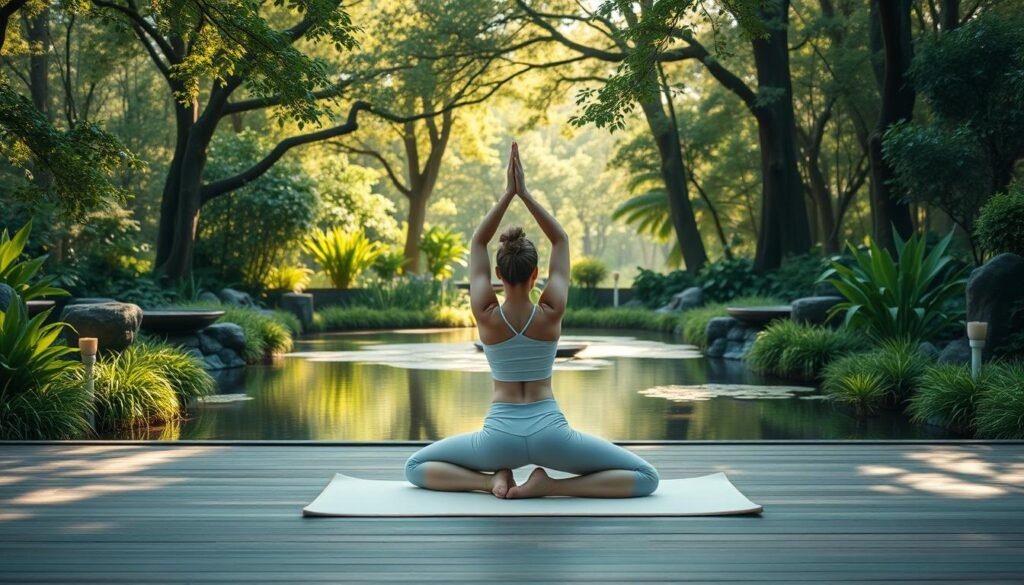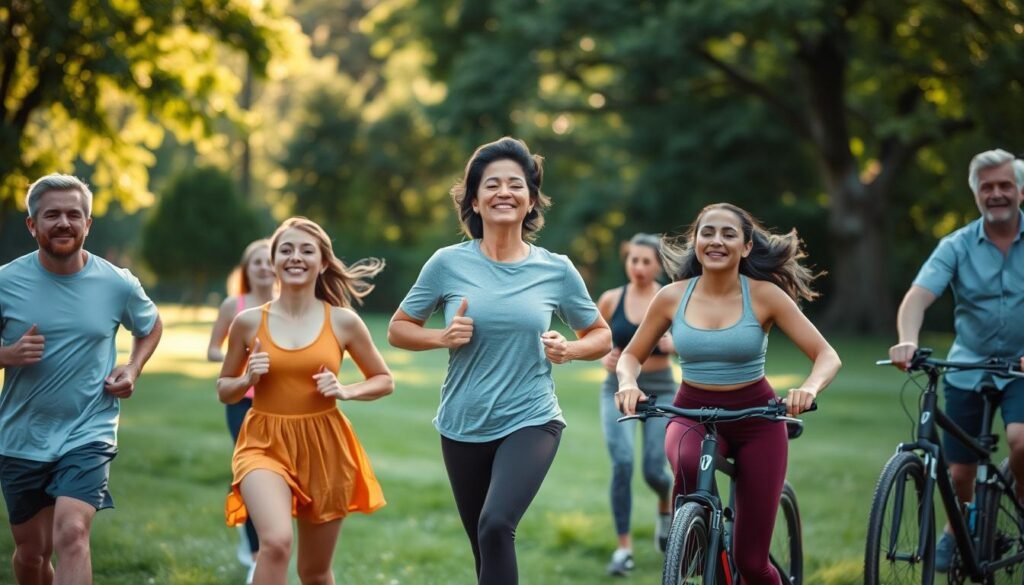Did you know nearly 35% of adults often feel anxious? This high number shows we need good ways to fight anxiety and improve our mental health. The Mayo Clinic says regular exercise helps a lot with stress and mental health. It’s a natural solution for people with anxiety disorders. Studies prove that exercise makes you happier and reduces anxiety. This article talks about how different exercises can help your mind. It tells you why exercise should be part of your daily life for better health.
Key Takeaways
- Regular exercise greatly helps with reducing anxiety.
- Physical activity makes you feel better and more confident.
- Try to get at least 150 minutes of moderate exercise like walking fast each week.
- Choosing fun exercises makes it easier to keep doing them.
- Even short exercise sessions can make you feel better mentally.
- Exercising with others can help you stay motivated and focused.
The Connection Between Exercise and Mental Health
Exercise and mental health are closely linked. Many studies show that being active greatly reduces anxiety and depression symptoms. Working out raises endorphin levels in our brains. This improves how we feel overall.
Physical activity does more than make you feel good short term. It offers lasting benefits that can stop anxiety from coming back. The benefits of physical activity are huge and varied.
The Centers for Disease Control and Prevention suggest getting at least 30 minutes of exercise most days. This routine cuts health risks and boosts both body and mind health. Studies show exercising can decrease death rates for men and women by up to 30%.
About 29% of Americans will face an anxiety disorder at some time. The cost of these disorders is huge, about $42.3 billion. Hence, staying active is a key way to manage anxiety. Activities can uplift self-esteem, improve memory, and make thinking clearer. This leads to lots of positive mental changes.
Different activities help our mental state. Simple things, like walking, gardening, or washing the car, make us feel better. You don’t need a complex plan to see benefits; short active moments add up over the day.
| Physical Activity | Benefits |
|---|---|
| Walking | Improves mood, reduces stress levels |
| Yoga | Enhances relaxation, promotes mindfulness |
| Cycling | Boosts cardiovascular health, lowers anxiety |
| Gardening | Encourages physical movement, reduces feelings of isolation |
Adding exercise to your daily routine can improve mental health. Combining workouts with therapy offers big benefits for fighting anxiety. An active life builds resilience and equips us to deal with stress better.
Understanding Anxiety: Causes and Symptoms
About 40 million adults in the U.S. are affected by anxiety. It’s the number one mental health issue they face. Knowing what causes anxiety is crucial. It might come from our genes, the places we live, or health problems like thyroid disorders. People with anxiety might feel very nervous, restless, and have a fast heartbeat or tight muscles.
When we understand anxiety, we can find better ways to deal with it. Moving our bodies more can cut down the risk of getting anxious or depressed by 25% in five years. Research says that working out can help as much as medication. Even quick activities, like a swift walk or a 10-minute stroll, can make us feel better right away.
If we don’t move much, we might feel more anxious or sad than active people. The government says adults should do moderate exercise for at least 2½ hours a week. Being active is good for our bodies and makes our minds healthier, too.
https://www.youtube.com/watch?v=3cXGt2d1RyQ&pp=ygUJI2FueGlldHlh
To really get anxiety, it’s important to know what makes it worse for us. Then, finding ways to handle it is key. Exercise can help a lot. It lowers anxiety and makes us feel more emotionally stable.
How Exercise Can Reduce Anxiety and Promote Relaxation
Regular exercise is great for your body and mind. It helps reduce anxiety and makes you feel relaxed. This happens because physical activity affects your body in powerful ways. For example, it triggers the release of endorphins. These chemicals improve your mood and make you feel happy.
Endorphin Release and Its Effects on Mood
When you workout, your body releases endorphins. This is known as endorphin release. Feeling good after a workout, like experiencing a “runner’s high,” comes from this process. Research supports this, showing exercise can lower anxiety and sadness. It also improves how you view yourself and your brain’s performance. So, working out regularly makes you feel better overall.
The Impact of Physical Activity on Stress Levels
Being active helps keep your mind off things that cause stress. This helps stop the cycle of worrying that comes with anxiety. Studies prove that exercise drops stress hormones like cortisol. Also, it helps you step away from daily stress. Activities like running or yoga help people feel less nervous and more emotionally strong. Both intense and gentle workouts can lower stress, ensuring benefits for your mood and stability.
To get the best results, aim for 150 minutes of moderate exercise each week. Doing this helps you enjoy all the good things exercise does for your mood and calmness. Understanding how important exercise is for mental health inspires us to include it in our daily lives. It’s also vital to sleep well, as it helps manage anxiety and stress. Studies make it clear that exercising and good sleep are key to a healthy mind and body.
| Type of Exercise | Benefits | Recommended Duration |
|---|---|---|
| Aerobic Activities | Improves cardiovascular health, reduces anxiety, enhances cognition | 150 minutes per week |
| Yoga | Reduces stress, improves flexibility, enhances emotional resilience | At least 30 minutes, 2-3 times a week |
| Mindful Walking | Improves mood, increases cognitive function, lowers anxiety | 20-30 minutes per day |
| Resistance Training | Decreases anxiety, boosts self-esteem | 2-3 sessions per week |
Types of Exercise Beneficial for Anxiety Relief
Exploring different exercises can help ease anxiety. Being active is great for your mental health. Things like running and yoga are really good for calming anxiety and making you feel better.
Aerobic Activities: Running, Swimming, and Cycling
Aerobic exercises are great for dealing with anxiety. Running, swimming, and cycling work out your big muscles and help your heart. Doing these activities often makes you happier and less stressed. Running, for example, makes your body release happy chemicals that lower stress.
Doing about 15 to 30 minutes of exercise like swimming can lessen anxiety. Physical activity benefits folks of all ages. Swimming works out your whole body and helps you chill. Cycling, outside or on a stationary bike, is also awesome for your mood and stress levels.
Mind-Body Practices: Yoga and Pilates
Yoga is known for making people feel calmer. It mixes breathing and being in the moment, improving your mental health. Studies show it helps with anxiety by making you feel more relaxed and happy. Yoga regularly also helps you sleep better and be less tense.
Pilates is kind of like yoga and has similar calming effects. It helps you focus on how your body lines up and strengthens your core. Doing Pilates or yoga regularly is good for your mind and builds up your mental strength.

| Type of Exercise | Benefits |
|---|---|
| Aerobic Activities | Reduces stress, boosts mood, improves cardiovascular health. |
| Mind-Body Practices | Enhances relaxation, improves mindfulness, aids in stress management. |
| Running | Releases endorphins, enhances mood, can have lasting impacts on mental health. |
| Yoga | Helps manage anxiety symptoms, promotes mindfulness, and improves sleep quality. |
| Swimming | Engages all muscle groups, supports relaxation, and boosts mood. |
| Pilates | Improves core strength, encourages mindfulness, and reduces tension. |
Incorporating Exercise into Your Daily Routine
Adding exercise to your daily life needs planning and dedication. Finding exercises you like and setting goals can make it enjoyable, not a chore. You don’t need a lot of time for a good workout. Short sessions are effective and boost mental health.
Setting Realistic Goals for Consistency
It’s key to have SMART goals for daily exercise. Start with easy goals, like three 10-minute sessions a day. This helps with well-being and lowers stress. The American Heart Association suggests 150 minutes of moderate exercise a week. Splitting this time into daily or weekly goals keeps you motivated without overwhelm.
Finding Activities You Enjoy
Enjoying your workouts is essential for sticking with them. Try different activities, such as walking, yoga, or HIIT, to find what you enjoy. It turns exercise into fun, not just a must-do. Exercising with friends or joining a fitness group also makes it more enjoyable. Activities that are fun help you stay consistent and improve mental health. For more on exercise and mental health, see this resource.
Short-Term Benefits of Exercise for Anxiety Management
Physical activity is great for quick anxiety relief. It offers a speedy boost in mood and lowers stress right away. When we start moving, our bodies release endorphins. These are chemicals that make us feel good. This can quickly reduce tension and anxiety, making us feel better and pushing us to keep going.
Immediate Mood Enhancement through Physical Activity
Even a little bit of exercise can make us feel much better. Studies show that just five minutes of aerobic activity can calm anxiety. Walking, running, or yoga can do more than ease stress. They also improve our mood and well-being. By being active, we can look forward to:
- Less stress and tension
- Higher self-esteem and confidence
- Better sleep quality
- A happier overall mood

These quick benefits make us want to exercise more. Making physical activity a regular habit improves our mood. It also prepares us to handle stress better in the future.
Long-Term Effects of Regular Exercise
Adding regular exercise to your life has many benefits. It goes beyond just easing stress quickly. With time, working out helps prevent anxiety and improves how we feel overall.
When you stick to a workout plan, you don’t just get stronger physically. You also become more emotionally stable and can handle life’s ups and downs better.
Preventing Future Anxiety Episodes
Studies show that keeping active has a big role in stopping anxiety before it starts. People who are regularly active have a much lower chance of feeling depressed or getting dementia. This shows how important it is to exercise at least 150 minutes every week.
Exercise can fight off mild anxiety and is a great way to make your mind healthier. It’s something easy you can do to feel better.
Building Resilience and Coping Strategies
People who work out often are better at dealing with stress. They develop ways to handle anxiety more effectively. Exercise doesn’t just lower stress. It also makes you feel better about yourself, no matter your age.
This change leads to a more positive outlook on life. It makes you more confident in facing tough situations.
| Benefits of Regular Exercise | Impact on Anxiety | Research Insights |
|---|---|---|
| Prevention of Anxiety Episodes | Lowered risk of anxiety and depression | 20%-30% reduction in risk for active individuals |
| Enhanced Emotional Stability | Improved coping mechanisms | Regular activity leads to lower panic rates |
| Self-Esteem Boost | Increased confidence and resilience | Positive influence across age groups |
Combining Exercise with Relaxation Techniques
Mixing relaxation methods with exercise improves both mental and body health. Using mindfulness and breathing exercises with workouts makes a complete plan for less anxiety. Doing these regularly lowers stress and brings a needed calm for handling anxiety well.
Mindfulness and Meditation as Complementary Practices
Mindfulness meditation is now a well-loved way to relax. It trains the mind to stay in the now, noticing thoughts and feelings without judging. This is key for lessening anxiety, helping manage emotions and stress reactions better. Adding mindfulness to your exercise, like yoga or steady activities, raises its soothing impact.
Using Breathing Exercises to Enhance Calmness
Breathing techniques are a powerful way to relax and cut stress. Deep breathing, with full, clean breaths, promotes calm and reduces anxiety. Adding these to your everyday routine boosts peace and health. Progressive muscle relaxation, which pairs physical ease with mindful breathing, tightens and relaxes muscles to deepen calmness.

Professional Guidance in Incorporating Exercise Therapy
Adding exercise therapy to manage anxiety can really help. It’s smart to get advice from pros. They match exercises to what people need and like. Health experts are key in designing a plan that works, guiding folks on their exercise path.
The Role of Mental Health Professionals
Mental health experts are crucial for exercise therapy. They check a person’s mental and physical health. Then, they make a workout plan just for their anxiety issues. They might suggest different activities, like aerobic workouts, lifting weights, or activities that calm the mind.
Creating a Personalized Exercise Plan
A custom exercise plan is more than general tips. It’s about personal goals and how fit you are. Such plans are key to really making therapy work. Plans might cover:
- Regular aerobic sessions to ease anxiety.
- Strength exercises to make you feel better about yourself.
- Yoga or similar practices for handling feelings.
Studies show that a proper program boosts physical activity and mental health. By exercising regularly, people can handle anxiety better. They might also get sharper mentally and more emotionally strong.
Conclusion
Exercise is key in fighting anxiety and boosting relaxation. Regular physical activity improves our emotional health. It helps manage anxiety and brings many health benefits.
Studies confirm exercise reduces anxiety and depression. Aerobic workouts, for example, lift self-esteem and lower negative thoughts. Exercise also boosts cognitive skills, helping with ADHD by regulating dopamine levels.
Physical activity is crucial for anxiety management and building resilience. It promotes healthier lifestyles for lasting well-being. To know more about exercise and mental health, check out this article.